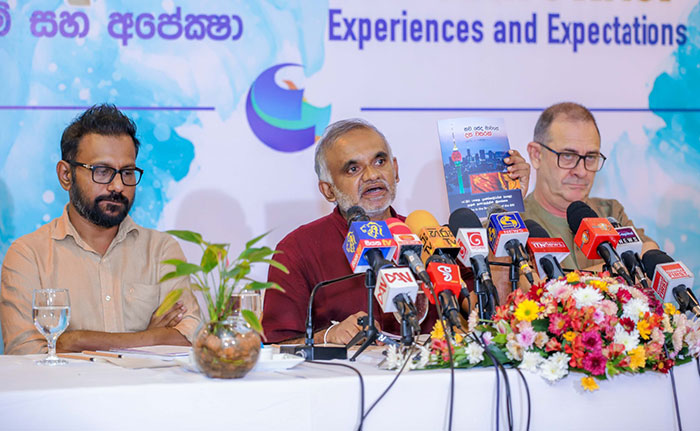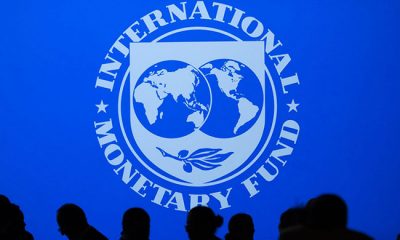News
Lanka got fewer benefits from Belt and Road Initiative due to anti-China environment created here – CP

In comparison with other countries, Sri Lanka had received fewer benefits from the Belt and Road Initiative, with investments amounting to 14 percent of the gross domestic product (GDP), the Communist Party of Sri Lanka (CPSL) affiliated Asia Progress Forum (APF) said.
The investments made by this Initiative in Laos and Cambodia are 140 percent and 60 percent, respectively of their GDPs, the APF said.
“This makes it clear that our country, which has over 2,000 years of relations with China, has benefitted very little from this Initiative. Moreover, the management of what we have already received has been sluggish and subject to discriminatory treatment, the APF said. The activities of the Colombo Port City may be cited as an example.”
Given below are excerpts of the APF statement: “Sri Lanka has received a low level of investment, as detailed above, because of its unstable policy situation and the anti-Chinese environment which has been created by Western vested interests. Fictional narratives such as “Chinese colony” and “Chinese debt-trap” have been publicised to the very highest level in our country. Fake narratives, such as “the Belt and Road Initiative strengthens autocracies,” have also been spread.
What is the autocracy which has been created by this Initiative in our country? Aren’t the United States and its allied Western countries the ones which interfere in our internal politics? Only about 10 percent of the foreign loans received by Sri Lanka have come from China. Yet over 42 percent are represented by short-term International Sovereign Bonds, for which high-interest loans have come from the capital markets of the West, including (prominently) the USA. Some 16 percent has been obtained by loans from multi-lateral institutions such as the World Bank.
“From this perspective, the loans received from the West total 58 percent. With the loan taken from the Paris Club, this figure exceeds 70 percent. This does not include loans from India. Nevertheless, the fictional “China debt-trap” narrative is what has been pushed in Sri Lanka.
“If not for the fake information and the wrong impression they create, we could have obtained considerable benefits from the Belt and Road Initiative, conditional on a stable policy framework. Chinese President Xi Jinping has clarified eight major steps for the future of the Belt and Road Initiative, from which we can get an idea of ways that Sri Lanka could benefit. In future this initiative will be multi-dimensional, encompassing land, sea and air.
“In the next five years, China will aid the openness of the world economy with $37 trillion in trade. In addition to large-scale projects such as those that were carried out hitherto, “small, but smart” livelihood programmes will also be promoted. This initiative will enhance green development and scientific and technological innovations. China will support the development of people-to-people connectivity and civilisational interaction. China is carrying out Belt and Road Initiative cooperation, based upon interconnectedness, as well as establishing institutions for international cooperation.
“We can expect Sri Lanka to receive benefits from the Belt and Road Initiative by basing itself on the above policy framework. Under this, we can expect a wide variety of activities, including establishing an Ocean University and vocational and technological educational institutes, village development, entering the Chinese market, and developing health, sports and recreation, media and communications, literature and arts, religious relations, care for the elderly and people-to-people connectivity.
The world order, which developed in a bipolar mode after the Second World War and in a unipolar mode after the fall of the Soviet Union, is being transformed to a multi-polar character by the Belt and Road Initiative. Western imperialism is weakening within this new international alignment, founded on the different world zones. Unable to tolerate these changes, the Western camp is promoting fictional narratives and relentless criticism of the Belt and Road Initiative. Having suffered under Western Imperialism for over 500 years, we should not be deceived by this propaganda. Basing ourselves on our own sovereignty, we should maximise the benefits we can receive from the Belt and Road Initiative.”
News
US sports envoys to Lanka to champion youth development

The U.S. Embassy in Colombo welcomed the U.S. Sports Envoys to Sri Lanka, former National Basketball Association (NBA) and Women’s National Basketball Association (WNBA) players Stephen Howard and Astou Ndiaye, from June 8 through 14.
The Public Diplomacy section of the U.S. Embassy said that it would launch a weeklong basketball program intended to harness the unifying power of sports, made possible through collaboration with Foundation of Goodness and IImpact Hoop Lab.
While in Sri Lanka, Howard and Ndiaye, both retired professional basketball players, will conduct a weeklong program, Hoops for Hope: Bridging Borders through Basketball. The Sports Envoys will lead basketball clinics and exhibition matches and engage in leadership sessions in Colombo and Southern Province for youth aged 14-18 from Northern, Uva, Eastern and Western Provinces, offering skills and leadership training both on and off the court. The U.S. Envoys will also share their expertise with the Sri Lanka Basketball Federation, national coaches, and players, furthering the development of basketball in the country. Beyond the clinics, they will collaborate with Sri Lankan schoolchildren to take part in a community service project in the Colombo area.
“We are so proud to welcome Stephen and Astou as our Sports Envoys to Sri Lanka, to build on the strong people-to-people connections between the United States and Sri Lanka,” said U.S. Ambassador Julie Chung. “The lessons that will be shared by our Sports Envoys – communication, teamwork, resilience, inclusion, and conflict resolution – are essential for leadership development, community building, equality, and peace. The U.S. Sports Envoy program is a testament to our belief that sports can be a powerful tool in promoting peace and unity.”
News
Rahuman questions sudden cancellation of leave of CEB employees

SJB Colombo District MP Mujibur Rahuman in parliament demanded to know from the government the reasons for CEB suspending the leave of all its employees until further notice from Thursday.
MP Rahuman said that the CEB has got an acting General Manager anew and the latter yesterday morning issued a circular suspending leave of all CEB employees with immediate effect until further notice.
“We demand that Minister Kanchana Wijesekera should explain this to the House. This circular was issued while this debate on the new Electricity Amendment Bill was pending. There are many who oppose this Bill. The Minister must tell parliament the reason for the urge to cancel the leave of CEB employees,” the MP said.However, Speaker Mahinda Yapa Abeywardena prevented Minister Wijesekera responding to the query and said that the matter raised by MP Rahuman was not relevant.
News
CIPM successfully concludes 8th Annual Symposium

The Chartered Institute of Personnel Management (CIPM) successfully concluded the 8th Annual CIPM Symposium, which took place on 31st May 2024. Themed “Nurturing the Human Element—Redefining HRM in a Rapidly Changing World,” the symposium underscored the pivotal role of human resource management (HRM) in today’s dynamic global landscape. Since its inception in 1959, CIPM has been dedicated to advancing the HR profession through education, professional development, and advocacy, solidifying its position as Sri Lanka’s leading professional body for HRM.
Ken Vijayakumar, the President of the CIPM, graced the occasion as the chief guest. The symposium commenced with the welcome address by the Chairperson, Prof. Arosha Adikaram, followed by the Web Launch of the Symposium Proceedings and Abstract Book by the CIPM President. The event featured distinguished addresses, including a speech by Chief Guest Ken Vijayakumar, President of CIPM, and an address by Guest of Honor Shakthi Ranatunga, Chief Operating Officer of MAS Holdings Pvt. Ltd., Sri Lanka.
The symposium also featured an inspiring keynote address by Prof. Mario Fernando, Professor of Management and Director of the Centre for Cross Cultural Management (CCCM) at the University of Wollongong, Australia.
Vote of Thanks of the inauguration session was delivered by Dr. Dillanjani Weeratunga, Symposium Co-chair.
The symposium served as a comprehensive platform for researchers to present their findings across a wide range of critical topics in HRM. These included Cultural Diversity and Inclusion, Talent Development and Retention, Ethical Leadership and Corporate Social Responsibility, Adapting to Technological Advancements, Mental Health and Well-being at Work, Global Workforce Challenges, Employee Empowerment, and Reskilling and Upskilling.
The plenary session was led by Prof. Wasantha Rajapakse. Certificates were awarded to the best paper presenters during the valedictory session, followed by a vote of thanks delivered by Kamani Perera, Manager of Research and Development.
The annual symposium of CIPM was a truly inclusive event, attracting a diverse audience that spanned undergraduates, graduates, working professionals, research scholars and lecturers. This widespread interest highlights the symposium’s significance in the field of HRM, offering a unique opportunity for everyone to network and learn from scholarly brains.The CIPM International Research Symposium was sponsored by Hambantota International Port, Sri Lanka Institute of Information Technology (SLIIT), E B Creasy & Co. PLC, and Print Xcel Company.






















